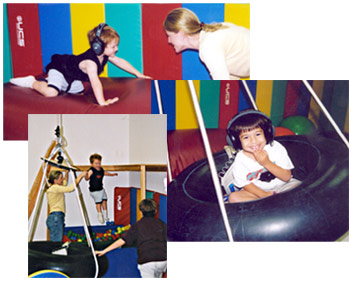
All of the information we receive about the world comes to us through our sensory systems. This ability to take in, sort out and produce an appropriate response is what we refer to as "sensory integration." This process is controlled by our central nervous system on an automatic level. Without an efficient nervous system, we are not able to comfortably interact with the world around us.
A child with sensory integration dysfunction may show some of the following signs:
|
Types Of Children Commonly Seen With Sensory Integration Dysfunction
-
Autism

Children diagnosed under the autism spectrum have sensory processing dysfunction that interferes with all aspects of their lives. These children typically show sensory seeking and/or sensory avoidance behavior. -
Learning Disabilities
Typically these children have difficulty with sensory modulation and self-regulation leading to attention deficits. Other areas that are usually affected are bilateral coordination, processing and handwriting. -
ADD/ADHD
Children with ADD/ADHD usually are found to have weak electrical firings at the neurochemical sites that allow the various parts of the brain to communicate with each other. Physical hyperactivity may be an attempt to "manually" stimulate their brain as a compensation for its lower voltage. -
Cerebral Palsy
Gross and fine motor development. Many children with cerebral palsy are hyperresponsive to movement/vestibular input. -
Handwriting Difficulty
Many children are referred for occupational therapy for handwriting. They typically have decreased postural stability, difficulty with in-hand manipulation skills and/or decreased grasp on their writing utensils. -
Central Auditory Processing
-
Visual Perceptual/Visual-Motor Skills
-
Developmental Delay

Children's Choice For Therapy
Veterans Professional Center
6924 W Linebaugh Ave • Tampa, FL 33625
(813) 962-6766







